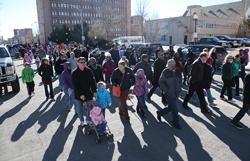
By JAMES CHILTON
January 21, 2014
Wyoming Tribune Eagle
CHEYENNE — More than 100 people marched from the Cheyenne Depot to the State Capitol on Monday in recognition of the work of Dr. Martin Luther King Jr.
It was the 32nd annual walk in recognition of the slain civil rights leader, who would have turned 85 years old on Jan. 15 had he not been assassinated on April 4, 1968, at age 39.
As a testament to his dream of a society free of racial prejudice, Monday’s march included men and women, black and white, young and old, from a variety of creeds.
“We are so grateful, God, because today is a day of joy and justice,” the Rev. Audette Fulbright of the Unitarian Universalist Church of Cheyenne said moments before the march got underway. “We are so grateful for days of celebration and memory like this one. Days when we walk out our door and stand together and give thanks, because we know you have helped make lions out of ordinary men and women n days to remember that, when we clasp hands and sing and keep walking forward, we shall overcome.”
The march, which was organized by the local nonprofit group Love and Charity, included tributes by several speakers to the importance of King’s work and the work that’s still left to be done, both in Wyoming and across the world.
“We continue to march today to celebrate Dr. King’s birthday, and to shed light on poverty, unemployment, discrimination in all forms, and violence in our neighborhoods,” Love and Charity spokeswoman Rita Watson said. “We’ve come a long way, but many of the concerns that motivated people to march 50 years ago remain problems today. … We must keep marching to help make our society better.”
Taking a populist focus, Watson noted that while the accomplishments of the civil rights era have led to a more inclusive society today, many millions of Americans n black, white and all shades in between n still find themselves crushed under the yoke of poverty. Drawing applause from the assembled crowd, Watson called for a renewed push toward the establishment of a living wage for American workers, and for a shortening of the gap between the wealthy and the middle and working classes.
“We rely heavily on our government to lead the way in making things right, but we need both the government and the private sector to solve our nation’s problems,” she said. “And while the government can’t fix the gap, it can do some things to narrow the gap; and with help from the private sector, we should be able to fix that gap. We must work together to make America a better place for everyone.”
Gov. Matt Mead was one of many state politicians to attend Monday’s march. Taking to the podium, Mead acknowledged the need to do better on issues like poverty, adding that the Equality State currently has the smallest proportion of children in poverty among the 50 states.
“But when we think about Dr. King, we know his message wasn’t just for us as individuals, it wasn’t just for our communities. His message was how we’re doing around the world,” Mead said. “Justice, equality, those who are in poverty n we need to think of all of those things.”
Mead described King as, above all, a man who got Americans to rethink the issues that unite us as a people, including the desire for peace, prosperity and mutual understanding.
“Dr. King got us thinking about this brotherhood of man, and his influence remains strong,” Mead said. “It guides us still in how we work together for a better quality of life and a better world for everyone. As a state, we can strive for programs that further the spirit of Dr. King’s work. … It is our duty to pass on a legacy so that those who come after us have a better life than did we.”
Cheyenne Mayor Rick Kaysen also spoke, sharing some of his constituents’ thoughts on what makes King’s legacy so important to them.
“Seeing how hard he fought in such great adversity gives me strength in my own life,” read one. “Knowing how much one can accomplish and how one can affect others gives me the courage to have dreams in my life’s journey and to never give up.”
Monday’s march also included readings of three essays written by school students from across the state. One essayist, Big Piney High School sophomore Kyrah Jones, drew parallels between King’s own quest for justice and the 1998 murder of University of Wyoming student Matthew Shepard.
“The two killers were spared the death sentence because of Matthew Shepard’s parents, who wanted the violence to end,” Jones read. “This is an example of why Dr. King was so passionate about protecting all individuals from the cruelties of how people view others who are considered different.
“While Martin Luther King Jr. was being ridiculed, he was doing exactly what he said in his quote, ‘Courage is the power of the mind to overcome fear,’” Jones continued. “It didn’t matter if he was being beaten, thrown in jail, or yelled and screamed at. He held firm to his dream of one day having a peaceful nation, one where everyone would be treated equally and would not have to worry about being judged or treated differently just because they were different from another person.”
https://www.wyomingnews.com/news/remembering-kings-dream/article_5a1a0bfe-cfa6-5e6b-9f0f-3db81d920083.html
